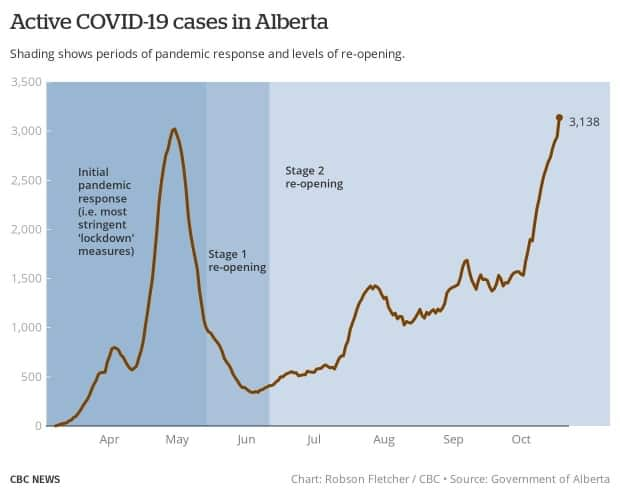Calgary 'superspreader' wedding led to at least 49 cases of COVID-19

At least 49 active cases of COVID-19 have been linked to a wedding with 63 attendees held earlier this month in Calgary.
It comes as Alberta hits its highest case numbers ever — 3,138 active cases, 998 of which are in Calgary.
The wedding featured a large number of Albertans from different households, Alberta Health spokesperson Tom McMillan said.
Aggressive contact tracing is underway to identify anyone who may have been exposed and ensure they are isolating and getting tested, and anyone at risk is being contacted directly by Alberta Health Services.
McMillan said Alberta Health can't comment on specifics about individual cases due to patient confidentiality, but he did say it's not yet clear what led to the level of exposure and that an investigation is underway.
Reminder that 'this virus is still here'
Several recent outbreaks in Calgary have been linked to social gatherings, he said, adding that no one should attend a gathering if they have even mild symptoms or are awaiting test results.
"This is a reminder to all Albertans that this virus is still here and any social gathering carries a risk of exposure. This is true for both planned events, like wedding receptions, or informal get-togethers in a house or community space," McMillan said.
WATCH | How contact tracing difficulties are hampering Alberta's attempts to control COVID-19:
"It is also important that organizers of social gatherings do everything possible to comply with the public health guidance in place, including ensuring that there is enough space for physical distancing between cohorts, following gathering size restrictions and avoiding sharing food and utensils."
Dr. Craig Jenne, an infectious disease expert with the University of Calgary, said based on the high transmission numbers, he would consider this event a "superspreader."
"Although 49 cases may not seem like a huge number, we have to keep in mind that these people have perhaps had continual contact with others after the wedding ... if each person passes [COVID-19] on to two, three, four other people, we may be looking at an event that has now led to 200, 300 or more cases in the community. And again, each of those cases has the potential to spread it further," he said.
WATCH | See what settings are at a higher risk for COVID-19 transmission:
"We also have to keep in mind that many of these gatherings … probably have a significant number of people that are in at-risk groups — older parents, grandparents."
Dr. Deena Hinshaw, Alberta's chief medical officer of health, said Tuesday that it's important to note that the wedding was not an outlier — the common thread of outbreaks at social gatherings is that people believe they are being careful but aren't being careful enough.
"We have had several wedding outbreaks that have happened over the past many months," she said.
"The people who were involved did nothing intentionally wrong, they were doing their best to follow guidance."
She pointed to other recent gatherings linked to outbreaks, like a workplace party that saw at least nine of 29 attendees test positive.
Dr. Joe Vipond, an ER physician in Calgary and a co-founder of the Masks4Canada advocacy group, said the incident demonstrates that Alberta's rules on the size of gatherings are not good enough to stop the spread of the virus.
The rules state that indoor social gatherings cannot have more than 50 people, while outdoor events are capped at 100.
"Instead of vilifying the people that are hosting this event, I think we really need to recognize this is really a failure of our guidelines at a time when we have exponential COVID-19 growth," Vipond said.
"We just seem to be failing to learn from other places when they were at this level of the curve."
Jenne said while it's worth looking at whether guidelines like physical distancing, mask-wearing and attendance numbers were followed, ultimately, having large indoor gatherings right now simply isn't safe.
"The virus doesn't really care that you wore a mask until you sat down at the table … you have 100 people eating in the same room and multiple people at tables, this really creates an opportunity for the virus to move around," he said.
Hinshaw said the province is hoping to give Albertans every opportunity to demonstrate they can follow the voluntary guidelines before putting mandatory restrictions in place.


